M. Darusha Wehm's Blog, page 9
May 6, 2015
Recipes of Arkadia: Chen’s Herb Bread
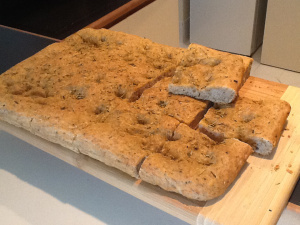
Food — growing it, preparing it, eating it — is a central part of life in the Arkadia space colony. Over the next few weeks I’m sharing recipes for some of the food mentioned in the book.
Isabel Hernández isn’t like the other residents of Arkadia. Chen helps her figure out how some parts of this society works and keeps her coming back to his market stall with both his knowledge and the savoury smell of this bread.
Recipes of Arkadia: Chen's Herb Bread
Servings
Prep Time
1loaf
30minutes
Cook Time
Passive Time
30minutes
3hours
Servings
Prep Time
1loaf
30minutes
Cook Time
Passive Time
30minutes
3hours
Ingredients
1 1/2cups
whole wheat flour
1 1/2cups
white flour
2tsp
yeast
1tsp
table salt
5tbsp
olive oil
1cup
warm water
1tbsp
mixed herbs(basil, oregano, marjoram)
1tbsp
rosemary leaves
sea salt
Instructions
Mix together the flours, salt, yeast and mixed herbs.
Add 3 tbsp of the olive oil and the warm water. Stir together until it's too hard to work with a spoon, then knead with your hands until it's all elastic. The dough will be moist.
Let it rise an hour or more, then punch it down and shape it into a rectangle. Place it on a baking sheet with about a teaspoon of oil rubbed over it. Let it rest about half an hour.
Stretch the dough out to the edges. Let it rest another half hour. Preheat oven to 425F/220C.
Poke some divots into the top of the loaf, then drizzle with the remaining olive oil and sprinkle with sea salt and rosemary. Reduce the oven temperature to 375F/200C and bake for about 30 minutes. Cool on a rack and cut into squares.
May 4, 2015
Interview with Josh Vogt, author of Enter the Janitor
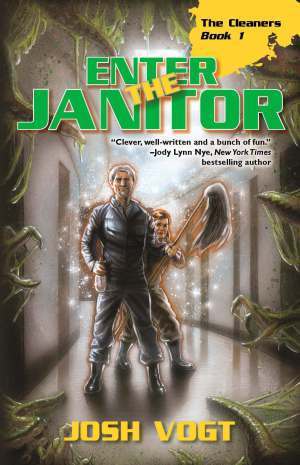
Josh is back, this time to talk about Enter the Janitor, the first book in his urban fantasy series.
A janitor working for a supernatural sanitation company must track down a fledgling demigod before it’s corrupted or destroyed, all while training a rebellious new employee whose fluctuating power could trash an entire city.
Me: Can you describe your writing for someone who is unfamiliar with it?
Josh: In most of my writing, no matter what genre it is or length it reaches, I tend to focus on dialogue, with a particular love for banter between characters. In Enter the Janitor, I aimed to emphasize the humor side of the story more than I had in previous stories—and found I really enjoyed working to bring the comedic elements to the surface as much as possible.
Me: Would you want to live in the world of your book? Why or why not?
Josh: The world of The Cleaners wouldn’t look to different from our own, especially since the supernatural sanitation company the plot revolves around works to hide today’s magic and monsters from public view as much as possible. It’d be fun to work for the company, wielding mops like staves and toilet plungers like wands. While you might get overlooked by most people for doing menial labor, it’d be satisfying to know you were actually playing a vital role in keeping the world safe (and clean).
Me: Why did you write this story? What is compelling about it for you?
Josh: The idea grabbed me and just wouldn’t let go. I greatly enjoy urban fantasy stories, but many protagonists in them take on similar roles: cops, detectives, investigators, military, government agents, etc. I wanted to play with fantasy heroes who took on a far different mantle in order to go where they were needed and get the job done. Janitors and other sanitation workers are around us all the time, often doing their work without any sort of recognition. But what if they were fighting for our survival all along?
Me: What surprised you while writing it?
Josh: It surprised me how well the concept of magical janitors, plumbers, maids, and other sanitation workers actually fits with both ancient mythology as well as modern society! I mean, look at witches and their stereotypical image of flying around on brooms. Or the idea of reincarnation and our current focus on recycling. Or how the rise of sanitation and hygiene efforts has been a cornerstone of civilization itself. It makes an odd sort of sense.
Me: How will reading it make people feel?
Josh: Aside from getting in good chuckles and laughs, I want people to feel like they’re getting a chance to peek behind the curtain, seeing another side of reality. The next time they bump into a janitor in their office building, see one mopping up spills in a grocery store, or spot a cleaning van on the highway, maybe some part of their mind will wonder, “What if…?”
Me: Was there anything you did deliberately while crafting this novel (pacing, language, symbolism…)? Why?
Josh: Initially, the story wasn’t as humorously bent as it is now. It was more a straight urban fantasy with the occasionally absurd situation or banter. However, I realized the funny side needed to take more prominence, and so went back in and did my best to shift scenes and characters to reflect the humorous tone more—and I feel that definitely helped strengthen the story plus set it apart as a more unique approach to the genre.

Josh Vogt has been published in dozens of genre markets with work ranging from flash fiction to short stories to doorstopper novels that cover fantasy, science fiction, horror, humor, pulp, and more. His debut fantasy novel, Forge of Ashes, adds to the RPG Pathfinder Tales tie-in line. WordFire Press is also launching his urban fantasy series, The Cleaners, with Enter the Janitor (2015) and The Maids of Wrath (2016). You can find him at JRVogt.com or on Twitter @JRVogt. He’s a member of SFWA as well as the International Association of Media Tie-In Writers.
April 29, 2015
Recipes of Arkadia: Slava’s Moroccan Chick Pea Soup

Food — growing it, preparing it, eating it — is a central part of life in the Arkadia space colony. Over the next few weeks I’m sharing recipes for some of the food mentioned in the book.
This soup is Siobhan Patel’s favourite, so Vyacheslav Haeroa makes it as often as he can in his soup café. Whatever it takes to get her to see him.
Recipes of Arkadia: Slava's Moroccan Chick Pea Soup
Earth-based cooks can substitute canned tomatoes and chick peas.
Servings
Prep Time
2servings
30minutes
Cook Time
Passive Time
60minutes
12hours
Servings
Prep Time
2servings
30minutes
Cook Time
Passive Time
60minutes
12hours
Ingredients
4
tomatoes(diced)
3/4cup
dried chick peas(soaked overnight)
1
onion(chopped)
2cloves
garlic(minced)
1tbsp
flour
2cups
vegetable stock
2tsp
ground coriander
1tsp
cumin
1tsp
ginger
1tsp
turmeric
1tbsp
lemon juice
1tbsp
oil
Instructions
Soak dried chick peas in cold water overnight. They will double in size, so use a large bowl and enough water.
Saute onion and garlic.
Add spices, stir until onion is translucent.
Add flour, and cook a minute.
Add vegetable stock, bring to a boil.
Reduce heat as broth begins to thicken.
Add tomatoes and drained chickpeas, taste and adjust seasoning as desired.
Simmer 60-90 minutes (or about 15 minutes if using canned or pre-cooked chick peas).
Add a dash of lemon juice prior to serving.
April 27, 2015
Interview with Josh Vogt, author of Forge of Ashes
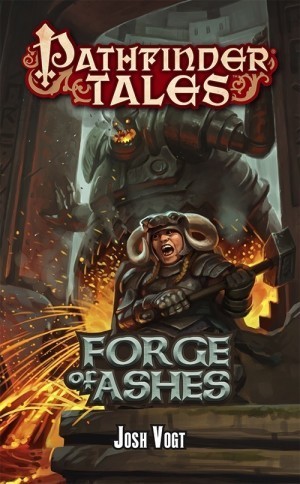
I had a chat with Josh Vogt, author of the fantasy Pathfinder tie-in Forge of Ashes. This is the first of two releases (stay tuned for the second next week!)
A decade ago, the dwarf warrior Akina left her home in the Five Kings Mountains to fight in the Goblinblood Wars. Now, at long last, she’s returning home, accompanied by Ondorum, a silent companion of living stone. But once you’ve traveled the world, can pastoral pastimes and small-town suitors ever be truly satisfying? Adding to Akina’s growing discomfort is the fact that her mother has disappeared into the endless caverns beneath the city. In an effort to save her, Akina and Ondorum must venture below the surface themselves—and into a danger greater than they could ever have imagined.
Me: Can you describe your writing for someone who is unfamiliar with it?
Josh: Well, it’s actually pretty varied. I write across multiple genres (and subgenres), including fantasy, epic fantasy, urban fantasy, sword and sorcery, science fiction, horror, humor, pulp, and mixes of all those and more. I’ve got two novels debuting this year, I’ve published a couple dozen short stories and flash fiction pieces, and I also freelance for a number of RPG developers and publishers. So I like to write across as many formats and styles as possible.
Me: Would you want to live in the world of your book? Why or why not?
Josh: Forge of Ashes is set in the roleplaying world of Golarion, from Paizo’s Pathfinder world. I’m a bit torn by this question because, while Golarion is an incredibly dangerous reality, it’s also exceptionally fascinating and colorful. I think I’d like to visit there, to at least get a chance to live in a world of unending magic and adventure—all the while knowing I might get eaten by a troll if I let my guard down.
Me: Why did you write this story? What is compelling about it for you?
Josh: I wrote Forge of Ashes for several reasons. First, I wanted to break into writing for RPGs, and jumped at the chance to pitch a novel for Paizo when they offered the opportunity. Second, I love writing solid adventure tales, which is much of what Pathfinder is about. I love stories that are a mix of fun and thrilling and have a fair share of action in them, so that’s what I set out to write here.
Me: What surprised you while writing it?
Josh: The main character, Akina, is a dwarven barbarian with a bit of a temper. Yet as I wrote more of her journeys, it surprised and delighted me to discover more of the depth she held as a person. She may not have a softer side, in the traditional sense, but she cares greatly for certain people in her life and will fight for them to the very end. She struggles to retain a sense of self and purpose in a world given over to violence and endless struggle for survival. These realizations helped bring her much more to life in my mind.
Me: How will reading it make people feel?
That they’re on a dangerous adventure full of monsters, magic, and mayhem. That there’s always something around the corner, likely waiting to eat them. I hope it can leave some people a little breathless, like in the aftermath of a battle.
Me: Was there anything you did deliberately while crafting this novel (pacing, language, symbolism…)? Why?
Josh: One of the issues in the story is Akina confronting her brother’s wayward lifestyle, often getting drunk and generally making a mess of himself. Yet at the same time, she tends to lose herself in a battle fury, getting intoxicated with violence and bloodshed. I tried to parallel these two dynamics, showing how each of them is, in a way, addicted to unhealthy coping mechanisms while ignoring the underlying issues that drive their negative behavior. It was an experiment to show how different people can struggle with similar problems in both internal and external ways.

Josh Vogt has been published in dozens of genre markets with work ranging from flash fiction to short stories to doorstopper novels that cover fantasy, science fiction, horror, humor, pulp, and more. His debut fantasy novel, Forge of Ashes, adds to the RPG Pathfinder Tales tie-in line. WordFire Press is also launching his urban fantasy series, The Cleaners, with Enter the Janitor (2015) and The Maids of Wrath (2016). You can find him at JRVogt.com or on Twitter @JRVogt. He’s a member of SFWA as well as the International Association of Media Tie-In Writers.
April 22, 2015
Recipes of Arkadia: Camilo Molina’s Nutty Oat Bars

Food — growing it, preparing it, eating it — is a central part of life in the Arkadia space colony. Over the next few weeks I’m sharing recipes for some of the food mentioned in the book.
Camilo Molina is someone who wants to make sure no one goes hungry. A homebody and, with his husband Cliff, adoptive parent to a house full of kids, Camilo is one of those people who is always in the kitchen. For him, food is love, snacks are comfort and baking is stress relief. So, when one of his kids goes missing, Camilo’s kitchen starts to look like a commercial bakery.
Here’s one of his favourites.
Recipes of Arkadia: Camilo Molina's Nutty Oat Bars
Servings
Prep Time
16bars
15minutes
Cook Time
20minutes
Servings
Prep Time
16bars
15minutes
Cook Time
20minutes
Ingredients
1/2cup
butter(melted)
1
egg
1/2cup
honey(or brown sugar)
1/2cup
nut butter(peanut butter)
1cup
whole wheat flour
1/2cup
rolled oats
1tsp
baking soda(reduce to 1/2 tsp if using sugar instead of honey)
pinch
salt
1cup
mixed nuts, dried fruit(can add chocolate chunks)
Instructions
Preheat the oven to 350F/200C.
Beat the egg, butter and honey (or sugar) with a fork until it’s fluffy. Earthers can add a drop pr two of vanilla extract here. Then stir in the nut butter.
Once that’s all smooth, add the oats and mix well so the oats are all damp.
Add the flour, baking soda, salt. Stir until it's just mixed, then stir in the fruit and nuts.
Pour it into a pan, smoothing it out with the back of a spoon. Bake for 18 to 22 minutes until the centre is solid and the top is golden. Let it cool a bit to firm up, then slice into bars.
April 15, 2015
Recipes of Arkadia: Betsy Rhys-Jones’s Spicy Vegetable Stew

Food — growing it, preparing it, eating it — is a central part of life in the Arkadia space colony. Over the next few weeks I’m sharing recipes for some of the food mentioned in the book.
Betsy isn’t one to build a community hall or tend to crops, but she isn’t content to just sit by the riverside. She loves to cook, but cooking for one is a pain. So why not share with everyone?
Recipes of Arkadia: Betsy Rhys-Jones's Spicy Vegetable Stew
Servings
Prep Time
2servings
20minutes
Cook Time
1hour
Servings
Prep Time
2servings
20minutes
Cook Time
1hour
Ingredients
1tbsp
oil
1
onion(diced)
1
potato(small)
1
yam(small)
1/2cup
lentils(or other pre-soaked beans)
1cup
green beans(or other chopped vegetables)
2cups
vegetable stock
1/2tsp
ginger
1/2tsp
cinnamon
1/4tsp
cayenne
salt
black pepper
Instructions
Sauté the onion in the oil, with salt, pepper and other spices. (Note - spice amounts are approximate. Adjust to taste/smell).
When the onions are translucent, add the stock and beans. Cover and simmer until the beans are just tender but not quite done.
Add chopped potato and yam. If necessary, add stock/water to cover. Simmer about 10 minutes.
Add the green beans or other vegetables. Simmer until potatoes are soft. Serve with rice or fresh bread.
Recipe Notes
The cook and prep time is highly dependent on what (or if) dried beans are used. Lentils and pre-soaked chick peas cook in about half an hour, other pre-soaked beans can take up to an hour and a half. But you can let the stew just simmer on the stove while you do other things, making the house smell wonderful. Or use canned beans. That works, too.
April 12, 2015
3-2-1 Book Launch!
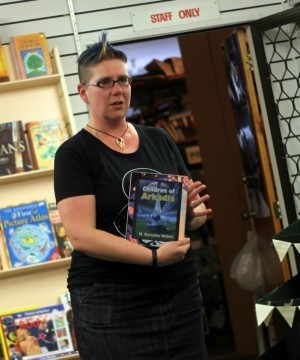
At the New Zealand National Science Fiction and Fantasy Convention on Easter weekend, I was lucky to be able to pre-launch Children of Arkadia along with several other awesome local authors.

Gail Carriger
We were welcomed by local Rotorua bookshop Atlantis Books, and after a great Q and A with the con’s Guests of Honour Gail Carriger, Phillippa Ballantine and Tee Morris, we read a little from our books for the generous crowd.
First up was Debbie Cowens, with her Sherlock Holmes/Jane Austen mashup, Murder & Matchmaking.
Then Darian Smith read from his debut novel, Currents of Change .
.
Up next, I read the first chapter of Children of Arkadia, then the Australian FFANZ delegate to the convention, David McDonald read from his story “Her Face Like Lightning” from the anthology Insert Title Here .
.
Last but not least, CY Smith read from her new collection, The Chasm .
.
It was a great evening and I’m especially grateful to the folks at Atlantis Books for being so welcoming and genuinely excited about all our books. They were awesome! If you’re ever in Rotorua, go check them out. It’s a beautiful shop!
All photos by Matt Cowens
April 9, 2015
Thoughts on Awards

This post is about the Hugo fracas, but it’s also about awards in general.
If you don’t know about the current brouhaha regarding this year’s Hugo Award nominees, I’d recommend that for your own sanity you don’t read the rest of this post and go do something more fun. Like read a book, for example.
If you still want to know what’s what, you could do worse than read George R.R. Martin’s well-reasoned explanation and opinion. Of course, it’s long, written in many parts and not finished yet. But still —go do that. I’ll wait. The first part is here and it continues with subsequent posts.
So. Awards. I strongly dislike popular vote awards. They inherently reward campaigning, slates and bloc voting. And, not to put too fine a point on it, popular works already enjoy the natural rewards of popularity: eyeballs, pageviews, buzz and sales. I frankly don’t get the point of having an award for popularity. It’s double-dipping, But, they exist and like everything else in the universe that isn’t my personal ideal, my options are to participate and try to change things for the better if possible, or just opt out.
The Hugos are part of my community, part of my business. I might not like the way they are structured, but they are what they are. If I participated in the past (which I have done) I can’t opt out now just because some if their inherent flaws have been made obvious.
However, some people have argued that even participating in this year’s Hugos validates the use of slates and breaks the Hugos.
Bullshit.
Any system that requires adherence to unwritten rules in order to function properly is broken from inception. All straight popular vote awards open themselves to slates and bloc voting, it’s just a matter of people deciding they want to make it happen.
I’ll be giving everything in the Hugo packet a shot, even if that means I stop reading immediately after I see the author or publisher’s name. I’ll vote for what I think is award worthy and vote No Award before anything that isn’t, just like every year.
I personally hope that this debacle forces a rewrite of the actual Hugo rules to reflect the way voting is intended to occur. Regardless of the intentions of the slate-makers (and I personally deplore everything about “Rabid Puppies”) I just can’t sympathize too strongly with an organization losing its shit over people following their rules.
The nominees, on the other hand, have all my sympathy, congratulations and good wishes.
April 8, 2015
Recipes of Arkadia: Chen Wu’s Seed Loaf
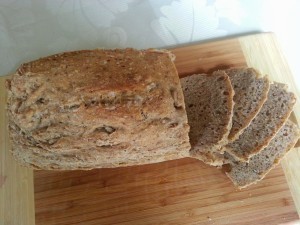
Food — growing it, preparing it, eating it — is a central part of life in the Arkadia space colony. Over the next few weeks I’m sharing recipes for some of the food mentioned in the book.
Chen Wu, one of Arkadia’s volunteer bakers, doesn’t think of himself as lazy — he’s efficient. He makes a lot of bread, so he does it the easy way: by letting time do the work.
Recipes of Arkadia: Chen Wu's Seed Loaf
Servings
Prep Time
1loaf
10minutes
Cook Time
Passive Time
50minutes
18hours
Servings
Prep Time
1loaf
10minutes
Cook Time
Passive Time
50minutes
18hours
Ingredients
4cups
flour
1tsp
salt
1/2tsp
yeast
2cups
water
1/2cup
seeds(flax, sunflower, chia, sesame, whatever)
Instructions
Add all the dry ingredients to a large bowl and stir them up.
Add 2 cups of warm water, mix until you get a damp, doughy ball. You can do this all with a wooden spoon, there’s no need to knead! Cover with a cloth and let it sit overnight.
The next day, pour the dough into a loaf pan and bake at 220C/425F for 40-60 minutes.
Recipe Notes
This seed loaf is my real-life everyday bread, using 3 cups of white flour, 1 cup of whole wheat and flax seed or meal. I’ve let the dough sit for more than 24 hours and as little as 8 hours. Longer is better, but the bread has always turned out.
You can use more or fewer seeds; I wouldn't go with more than a cup, though.
This recipe is based on Jim Lahey’s No-Work Bread, from How To Cook Everything.
April 4, 2015
Ebook update
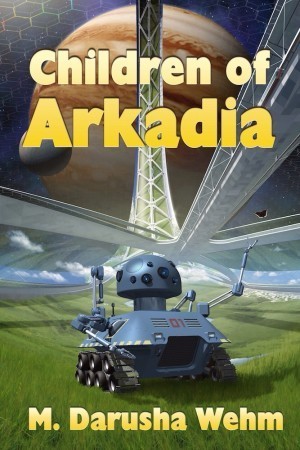
The Bundoran Press website is under maintenance, but the ebook of Children of Arkadia is up now for Kindles and will be available on Kobo in a few days.



